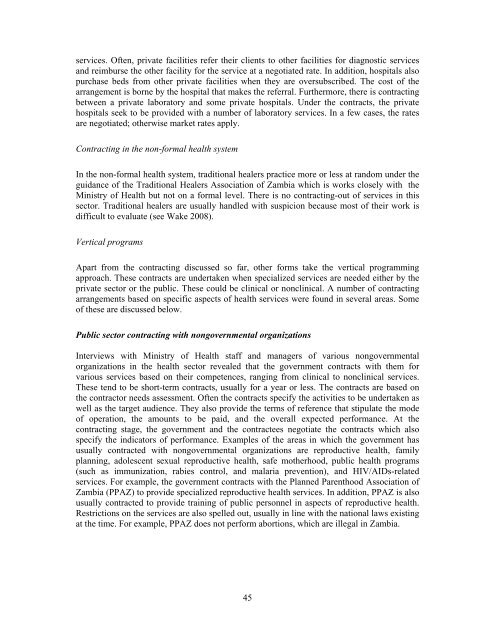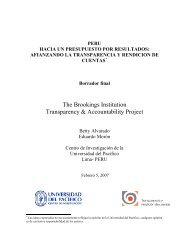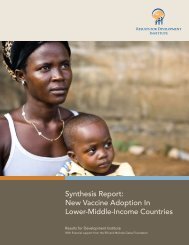Provider Purchasing and Contracting for Health Services_The Case
Provider Purchasing and Contracting for Health Services_The Case
Provider Purchasing and Contracting for Health Services_The Case
Create successful ePaper yourself
Turn your PDF publications into a flip-book with our unique Google optimized e-Paper software.
services. Often, private facilities refer their clients to other facilities <strong>for</strong> diagnostic services<br />
<strong>and</strong> reimburse the other facility <strong>for</strong> the service at a negotiated rate. In addition, hospitals also<br />
purchase beds from other private facilities when they are oversubscribed. <strong>The</strong> cost of the<br />
arrangement is borne by the hospital that makes the referral. Furthermore, there is contracting<br />
between a private laboratory <strong>and</strong> some private hospitals. Under the contracts, the private<br />
hospitals seek to be provided with a number of laboratory services. In a few cases, the rates<br />
are negotiated; otherwise market rates apply.<br />
<strong>Contracting</strong> in the non-<strong>for</strong>mal health system<br />
In the non-<strong>for</strong>mal health system, traditional healers practice more or less at r<strong>and</strong>om under the<br />
guidance of the Traditional Healers Association of Zambia which is works closely with the<br />
Ministry of <strong>Health</strong> but not on a <strong>for</strong>mal level. <strong>The</strong>re is no contracting-out of services in this<br />
sector. Traditional healers are usually h<strong>and</strong>led with suspicion because most of their work is<br />
difficult to evaluate (see Wake 2008).<br />
Vertical programs<br />
Apart from the contracting discussed so far, other <strong>for</strong>ms take the vertical programming<br />
approach. <strong>The</strong>se contracts are undertaken when specialized services are needed either by the<br />
private sector or the public. <strong>The</strong>se could be clinical or nonclinical. A number of contracting<br />
arrangements based on specific aspects of health services were found in several areas. Some<br />
of these are discussed below.<br />
Public sector contracting with nongovernmental organizations<br />
Interviews with Ministry of <strong>Health</strong> staff <strong>and</strong> managers of various nongovernmental<br />
organizations in the health sector revealed that the government contracts with them <strong>for</strong><br />
various services based on their competences, ranging from clinical to nonclinical services.<br />
<strong>The</strong>se tend to be short-term contracts, usually <strong>for</strong> a year or less. <strong>The</strong> contracts are based on<br />
the contractor needs assessment. Often the contracts specify the activities to be undertaken as<br />
well as the target audience. <strong>The</strong>y also provide the terms of reference that stipulate the mode<br />
of operation, the amounts to be paid, <strong>and</strong> the overall expected per<strong>for</strong>mance. At the<br />
contracting stage, the government <strong>and</strong> the contractees negotiate the contracts which also<br />
specify the indicators of per<strong>for</strong>mance. Examples of the areas in which the government has<br />
usually contracted with nongovernmental organizations are reproductive health, family<br />
planning, adolescent sexual reproductive health, safe motherhood, public health programs<br />
(such as immunization, rabies control, <strong>and</strong> malaria prevention), <strong>and</strong> HIV/AIDs-related<br />
services. For example, the government contracts with the Planned Parenthood Association of<br />
Zambia (PPAZ) to provide specialized reproductive health services. In addition, PPAZ is also<br />
usually contracted to provide training of public personnel in aspects of reproductive health.<br />
Restrictions on the services are also spelled out, usually in line with the national laws existing<br />
at the time. For example, PPAZ does not per<strong>for</strong>m abortions, which are illegal in Zambia.<br />
45
















